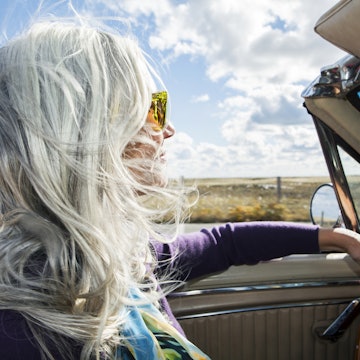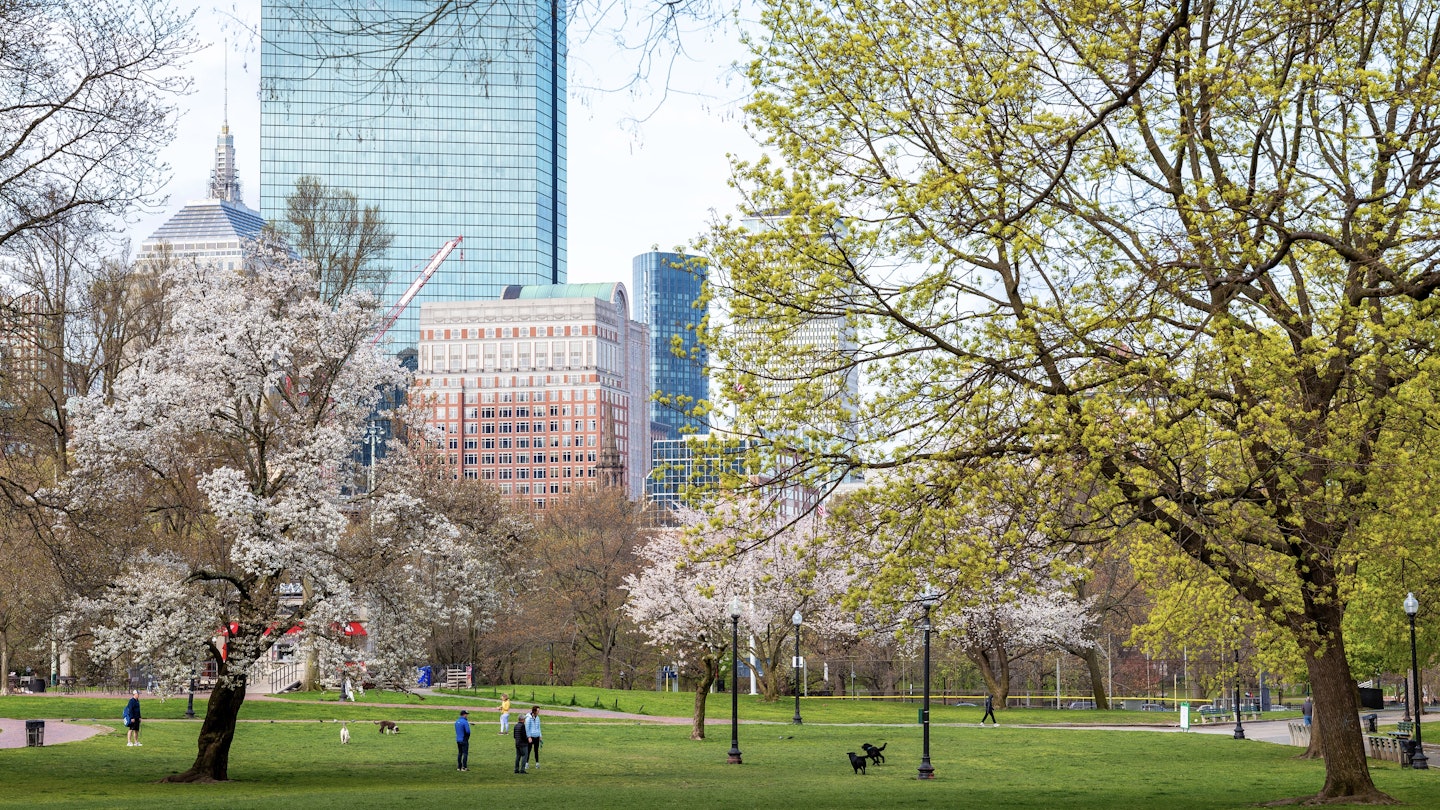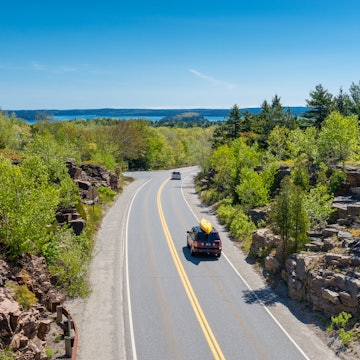

Boston Common in spring. Marcio Jose Bastos Silva/Shutterstock
One of the US’s oldest cities, Boston has a rich legacy of both revolution and transformation – and even with its plethora of historic attractions, it remains one of the country's most forward-thinking and barrier-breaking destinations.
Yet taking advantage of Boston’s world-class restaurants, museums and shops can quickly add up, straining any visitor’s budget. Which is why we’ve put together this list of exciting, unique experiences you can enjoy in town without spending a dime.
These are the best free things to do in Boston.
1. Walk around Boston Common
A stroll through gracious Boston Common, the oldest park in the US, is a quintessential experience. In summer, you can picnic or catch a free Shakespeare performance from the Commonwealth Shakespeare Company. Winter brings Christmas festivities, sledding down Flagstaff Hill and ice skating on Frog Pond.
Planning tip: Admission charges for skaters on Frog Pond are based on height. It costs $8 if you have your own skates, but it is free for those under 58 inches tall.

2. See a show at the Hatch Memorial Shell
The Charles River Esplanade is Boston’s backyard and a fine venue for picnics, bike rides and leisurely strolls. Even better: all summer long, the Hatch Memorial Shell hosts free events like outdoor concerts, family movies and Dancing in the Park.
Planning tip: There’s no permanent seating at the venue – so bring a picnic blanket and some food to join the locals on the lawn.
3. Peek inside artists’ studios on SoWa Sundays and First Fridays
From the former factories and warehouses in the South End, artists have carved out studios and gallery spaces. You can get a taste of the neighborhood’s creative energy at the open studio event held by SoWa Artists Guild every Sunday (11am to 4pm) and on the first Friday of every month (5pm to 9pm). Come examine the art and mingle with the resident artists.

4. Get close to history at Faneuil Hall
This historic meeting site and marketplace was the forum for some of the most important events in the history of Boston – and the USA. You can learn all about its fascinating backstory during a talk in the Great Hall led by a ranger (it’s part of the federally designated Boston National Historical Park). Continue the tour of Boston’s historic marketplaces and load up for lunch by heading to Quincy Market next door, and take your pick from dozens of food stalls.
Planning tip: The Great Hall is closed on Mondays and Tuesdays from November through May.
5. Discover the Collection of Historical Scientific Instruments
Science lovers and history buffs will love geeking out over the fascinating Collection of Historical Scientific Instruments. Located inside the Harvard Science Center, you can admire a selection of 20,000 items from the university collection, some of which date to the 15th century. Look for the geometric sector designed by Galileo, and the clocks that illustrate the development of modern timekeeping.

6. Watch a Fenway Park game at a bar behind center field
If you don’t want to shell out for tickets to a game, you can still sneak a peek inside Fenway Park. Underneath the fabled ballpark’s thousands of seats lies the Bleacher Bar, which is accessible from Lansdowne St and which has a grated window looking onto center field. The bar gets packed during games, when there’s usually a waiting list for window seating.
7. Climb up the Bunker Hill Monument
The landmark obelisk marks the site of the fateful battle in June 1775 that turned the tides of the Revolutionary War. Climb the 294 steps of the Bunker Hill Monument to the top for an impressive panorama of city, sea and sky.

6. Tour the Boston Public Library
The flagship location of the Boston Public Library was built as a “shrine of letters” – but it’s a temple of art and architecture, too. Free guided tours depart from the main entrance; you can also pick up a brochure and guide yourself around the stunning halls, which are adorned with murals, many by John Singer Sargent. The BPL also hosts numerous author talks, musical performances and other free events.
Planning tip: The guided-tour schedule is subject to change so check online in advance. Tours last around an hour.
9. Check out JFK’s birthplace
John F Kennedy was born and raised in a modest clapboard house in Brookline, now the JFK National Historic Site. Guided tours allow visitors to see furnishings, photographs and mementos that have been preserved since the Kennedys were in residence.
Planning tip: The site is open from the end of May through the end of October. Check the website ahead of your visit to confirm opening hours.
10. Channel your inner poet at the Longfellow National Historic Site
For 45 years, Henry Wadsworth Longfellow lived and wrote poetry in a stately Georgian house near Harvard Square. The mansion contains many of the poet’s personal belongings, as well as lush period gardens that provided him with plenty of inspiration.
Planning tip: Entrance to the NPS-administered house is by guided tour only; check the online schedule before you go.

11. Follow the Freedom Trail
The Freedom Trail is a superb introduction to Revolutionary War–era Boston. This 2½-mile, red-brick path winds its way past 16 sites that earned this town its status as the Cradle of Liberty. The National Park Service has free audio tours, and you can download a map. Many (though not all) of the sites along the route are free to enter.
12. See politics in action at the Massachusetts State House
At the Massachusetts State House – sometimes called the “hub of the solar system” – you might have the chance to watch the members of the state’s House of Representatives or Senate debate the issues of the day live. Even when the bodies aren’t in session, you can learn all about the state insect (the ladybug) and pay your respects to the “Sacred Cod” that hangs in the House chamber.
Planning tip: Materials for self-guided tours can be collected from the second-floor information desk; visitors wanting a free guided tour will need to book in advance by phone (617-727-3676).

13. Go aboard the USS Constitution
The US Navy’s oldest commissioned warship (it first set sail in 1797), the USS Constitution is docked in the Charlestown Navy Yard. Navy officers lead free tours of the upper decks, where you'll learn about the ship’s exploits in the country’s earliest naval battles.
Planning tip: Reservations cannot be made in advance, and all visitors over 18 need a photo ID to access the ship.
14. See Harvard Yard through a student’s eyes
Students lead free historical tours of Harvard Yard, sharing their perspectives on campus and academic life at one of the world’s most storied universities. The one-hour tours depart from the Smith Campus Center.
Planning tip: Register in advance for a spot on a student-led tour. If they’re all full, you can download the Visit Harvard app, which has information for self-guided tours.

15. Admire nature’s beauty at the Arnold Arboretum
The 265-acre Arnold Arboretum is planted with more than 15,000 trees (many exotic) and flowering shrubs. This gem is pleasant all year long – but it’s particularly beautiful in the bloom of spring.
Planning tip: While dog walking, Frisbee throwing, bicycling, sledding and general contemplation are encouraged, picnicking and tree-climbing are not allowed.
16. Relax at Castle Island
At the edge of Boston’s East End, Castle Island was connected to the mainland long ago, and today is a vast waterside park with amazing skyline views. The massive Fort Independence is open for exploration and free tours; otherwise, you can relax on the beach, fish from the pier or dip your toes into the chilly harbor waters.

17. Get to know Boston’s Black history along the Black Heritage Trail
In Beacon Hill, the 1½-mile Black Heritage Trail explores the history of abolitionism and African American settlement in Boston. Download a map for a self-guided walking tour, or take a tour led by a ranger from the National Parks Service.
Planning tip: Ranger-led tours take place in summer months and last around 90 minutes. Register for your free place in advance through Eventbrite.
















